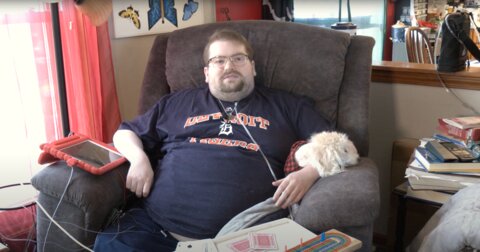Union targets home health helpers’ paychecks under the guise of collective bargaining
Bill aims to resurrect dues skim from 2005-13
Legislation that would resurrect a scheme to allow unions to target the federally subsidized paychecks of people who care for their disabled loved ones at home may pass the Michigan House this week.
The Mackinac Center for Public Policy called the original scheme, which lasted from 2005 until 2013, a “dues skim.”
The Service Employees International Union took $34 million from home health care helpers before the Legislature ended the practice. In 2012, voters rejected Proposition 4 in a 57-43% vote. The proposal asked voters if they wanted to provide collective bargaining to in-home care workers.
Sen. Kevin Hertel, D-St. Clair Shores, introduced Senate Bill 790 on March 14 to bring back the dues skim. If it were to take effect, home care helpers could once again see smaller paychecks from Medicaid and the state of Michigan.
Under the old scheme, many caregivers were unaware that a union was taking funds from their paychecks. Reinstating the arrangement would yield similar results, though the legal environment care givers would face has improved since the old scheme ended. In 2018, the U.S. Supreme Court ruled in Janus v. AFSCME that government employees who are represented by a collective bargaining agreement can’t be forced to pay union dues or agency fees. The ruling would protect home helpers who know their Janus rights.
SB 790 would require home health care workers to attend a half-hour presentation by the SEIU.
In a video recently produced by the Mackinac Center, a mother who cares for her 24-year-old disabled son on a full-time basis said that many people would be caught unaware by the change. “Well, families like ours don’t have time to hunt through fine print on things,” Tammy Martin said.
Family members who care for their loved ones are often pressed for time, Martin said, and they may not know where to find the information needed to keep them from being forced into a union. The path of least resistance, Martin said, would be to let the union take the money.
“I look at my son as one of the most vulnerable members of our population, and that is who we are going after, and that’s sad,” Martin said.
Once a home health care worker starts paying the union, it can be hard to stop, said Patrick Wright, vice president of legal affairs at the Mackinac Center.
“Unlike before, providers have a constitutional right not to provide any financial support to the unit, but these bills will make them sit through a 30-minute high-pressure sales presentation – like a timeshare pitch for unionization,” said Wright.
Wright said that contrary to claims made by the bill’s advocates, home health care helpers who want a pay increase do not need a union. Legislators are free to increase funding, and they have done so, he said. State funding for providers increased 85% after the last dues skim ended, Wright added.
Hertel did not respond to an email seeking comment.
The Senate approved SB 790 on a party-line vote of 20-18, with Democrats in the majority. The bill awaits action in the House and, if the House approves, Gov. Gretchen Whitmer’s signature.
CapCon will publish updates on this legislation as developments occur. Anyone who cares for a disabled individual and feels pressured into joining the union may contact the Mackinac Center for assistance.
Michigan Capitol Confidential is the news source produced by the Mackinac Center for Public Policy. Michigan Capitol Confidential reports with a free-market news perspective.


 Michigan House approves bills to resurrect dues skim for home health care providers
Michigan House approves bills to resurrect dues skim for home health care providers
 Supreme Court ruling could weaken renewed dues skim
Supreme Court ruling could weaken renewed dues skim
 Bills aim to return Michigan to bad old days of dues skim
Bills aim to return Michigan to bad old days of dues skim